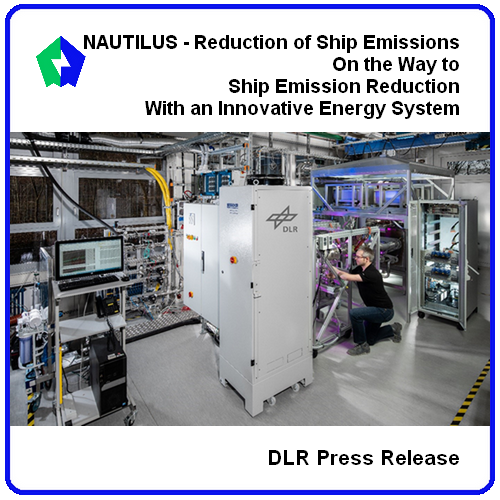|
On the Way to Ship Emission Reduction With an Innovative Energy System
Innovative Approach for the Emission-Free Maritime Transport In the context of strategies aimed at reducing emissions in maritime transport, the shipping sector is currently undergoing a significant technological transformation. Traditional diesel generators, which run on heavy fuel oil, are continuously replaced by hybrid system applications. These cutting-edge technologies are increasingly being incorporated into the propulsion systems of vessels not only to minimize emissions but also to enhance the economic efficiency of ship operations. The innovative technological solution proposed and developed in the NAUTILUS project is based on the combination of Solid Oxide Fuel Cells (SOFCs) and a battery storage system consisting of a conventional lithium-ion battery pack. This integrated system, referred as the Genset, is designed and tested to fulfil entirely the ship’s energy requirements during operation, manoeuvring, and accommodating hotel loads that represents approximately 15-20 percent of the cruise ship energy demand. Neither the SOFC nor the battery storage system can solely fulfil the total power demand of a cruise ship, which is the reason of coupling both in the propulsion system. The total power demand of a cruise ship will be split between the available power sources. The distribution of electrical power to the Genset requires intelligent control and management. The Energy Management Unit that can be embedded into the ship's grid is also developed by the NAUTILUS project consortium. The NAUTILUS project develops process design and a digital demonstrator of the on-board energy system, a physical Proof of Concept (PoC: 30 kWe SOFC + battery) and a modularized functional demonstrator (60 kWe SOFC + battery). The digital design as well as the physical demonstrator are evaluated against the marine safety regulations. Emissions from the genset demonstrator will be characterised in order to demonstrate the feasibility of the overall ambition to meet the emissions targets of 2030 of the IMO directive. To achieve International Maritime Organisation (IMO) emissions targets beyond 2030, the system is designed to be adaptable to various fuel options. Initially, the project will involve reformation of the LNG fuel for use by SOFC fuel cell. “The shift from diesel engines to gas engines is already happening,” explains Syed Asif Ansar of the DLR Institute of Engineering Thermodynamics, the coordinator of the NAUTILUS consortium. “Our immediate focus in NAUTILUS is to go beyond the IMO 2030 emission targets through an increase in the energy efficiency on board ships thanks to fuel cell and battery based power system. From there on, we intend to leverage synergy with the synthetic sustainable fuels, to complete the transition to net-zero.” Adopted Project Arrangements as Response on Changing Conditions To respond effectively to the rapidly changing business strategies and market demands, the consortium has recently implemented a setup for the demonstrator supporting this opportunity. In this arrangement, the fuel cell system is provided by SolydEra as a packaged solution, incorporating integrated auxiliary systems (Balance of Plant, BoP) as well as the system's control and piping. MAN Energy Solutions serves as the battery integrator, responsible for delivering a battery container equipped with a real-time PC, an electrical controller, and a safety protection system. Under the revised project infrastructure, DLR oversees the overall system integration of the battery container and SOFC system. The physical testing of the demonstrator at DLR’s Stuttgart premises is scheduled for the summer of 2024. The adoption of this new setup offers numerous advantages. Firstly, it simplifies the implementation process and reduces complexity by consolidating multiple suppliers and ultimately saving time. Seamless coordination among all components of the fuel cell system is guaranteed by integrated Balance of Plant (BoP), controller, and piping systems that are provided by SolydEra. The coherent operation of all components assures greater interoperability of the whole propulsion system. Additionally, the delivery of the comprehensive battery container by MAN Energy Solutions, completed with real-time PC, electrical controller, and safety protection system, ensures efficient battery integration. This shift in approach demonstrates the project team's adaptability to the new technology solutions, ensuring the successful completion of the NAUTILUS project. Highlights of the NAUTILUS project For the Virtual Process Design Concept of the On-Board Energy System
For the Physical Proof of Concept and Genset Demonstrator:
About NAUTILUS This project has received funding from the European Union’s Horizon 2020 research and innovation program under grant agreement No 861647. The project began in 2020, with an amount of 7.9 million euros over 54 months as a part of the Horizon 2020 programme. DLR coordinates the project joined by 15 leading shipping companies, cruise lines, shipyards, shipping authorities and research institutes: Deutsches Zentrum für Luft- und Raumfahrt, Chantiers de l'Atlantique, Carnival Maritime GmbH, Ecole Polytechnique Fédérale de Lausanne , GRANT Garant, Lloyd's Register, MAN Energy Solutions, Meyer Werft Papenburg, Rijksuniversiteit Groningen, Rheinisch-Westfälische Technische Hochschule Aachen, SolydEra S.p.A. Italy, Delft University of Technology, Lund University, VTT Technical Research Centre of Finland, SolydEra SA Switzerland. Picture above: Test facility GALACTICA at DLR Stuttgart for system relevant testing of SOFC module, battery and energy management unit. Source: DLR. |
This project has received funding from the European Union’s Horizon 2020 research and innovation program under grant agreement No 861647.
Stay in touch with us!
#NAUTILUS_2020 #propulsionsystem #sustainableshipping #battery #fuelcell #cruiseships
***
⇒ Follow us on Twitter/LinkedIn to be on board.
Follow #NAUTILUS_2020
NAUTILUS is a short for Nautical Integrated Hybrid Energy System for Long-haul Cruise Ships.

This project has received funding from the European Union’s Horizon 2020 research and innovation program under grant agreement No 861647.

